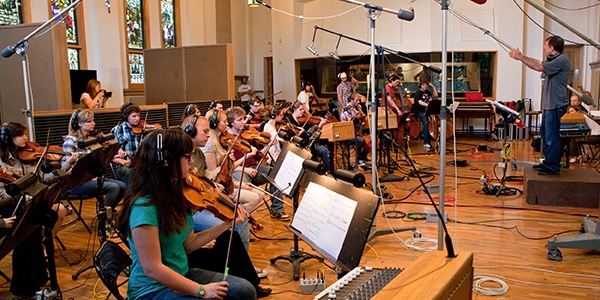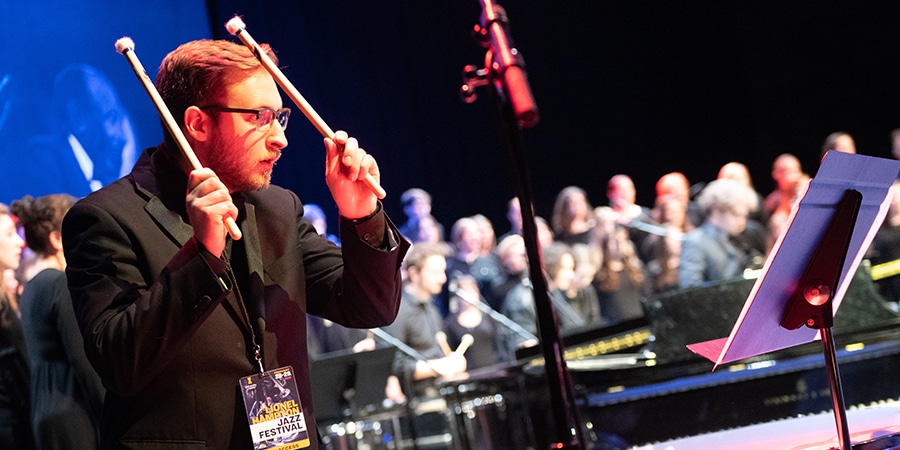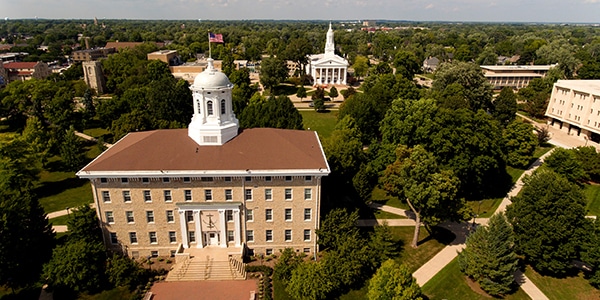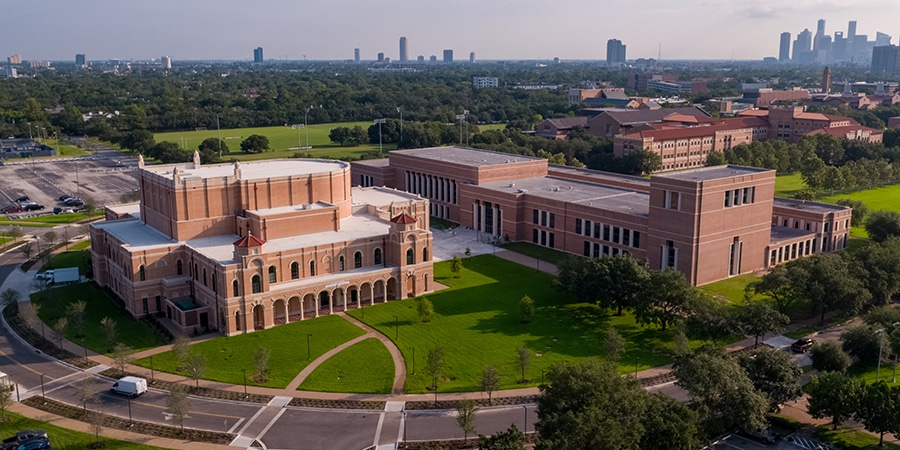Using key data factors and statistics provided by the National Center for Education Statistics, this is a list of the best colleges for music. This list compares and ranks the top 20 colleges in music in the U.S., and provides a guide to each ranked program.
For more programs check out our bachelor of music degree page.
| Rank | School | Location |
|---|---|---|
| 1 | UNC Greensboro (99 points) | Greensboro, North Carolina |
| 2 | Belmont University (96 points) | Nashville, Tennessee |
| 3 | University of Idaho (95 points) | Moscow, Idaho |
| 4 | Los Angeles College of Music (95 points) | Pasadena, California |
| 5 | Musicians Institute (94 points) | Los Angeles, California |
UNC Greensboro (99 points)
Combining world-class faculty and instruction, along with state-of-the-art facilities and many ensemble opportunities and experiences, the UNC Greensboro School of Music has been one of the top music institutions in the U.S. for years. It has also without surprise, not failed to make our list either. Offering students comprehensive degrees in areas like music education and performance, admission into the UNC Greensboro School of Music is a highly sought after prize for many students. Adding to its lure and putting the UNC Greensboro School of Music at the head of the class are tuition and acceptance rates that rank nearly as good as any other comparable program in the country, and better than most.
School Overview
Belmont University (96 points)

If you are wanting all the benefits and resources that major colleges offer, and the comfort, ease, and services of a small college, then Belmont University’s School of Music fits the bill. Not only is the Belmont University School of Music unmatched in its distinctive programs, and it is also nationally recognized for those same reasons. Offering students world-class instructors and a variety of degrees, the Belmont University School of Music allows students the opportunity to learn, experience, and discover music the Belmont way.
School Overview
University of Idaho (95 points)

What might be another surprise to many, and especially so high up on the list, is the University of Idaho’s The Lionel Hampton School of Music. A second look though, and it doesn’t take long to discover why this program ended up here. The Lionel Hampton School of Music itself is an intimate group of prominent performers, teachers, and composers, among others who work personally with the program’s talented students. The program’s instruction, its involvement in music competitions, and being an accredited school with the National Association of Schools of Music are only a few reasons why The Lionel Hampton School of Music program ranks as one of the best.
School Overview
Los Angeles College of Music (95 points)
It may not be any coincidence to find that there are several California schools on this list, as California has long-served as a hotspot for music and music trends. The Los Angeles College of Music (LACM) offers students a curriculum designed to prepare them for careers in the music industry. With programs that range from music performance and music production to songwriting and composing, LACM students learn from leading music professionals. The LACM campus is also comprised of gifted students from around the world, that exist together as a supportive and close environment, as they learn to create, record, perform, and even market their work together. Competitive tuition and a strong acceptance rate of more than 70% make the Los Angeles College of Music a most excellent choice.
School Overview
Musicians Institute (94 points)
There is in the hills of the Hollywood, California region, a hidden gem for those aspiring artists who know, and a surprise for those who haven’t discovered the Musicians Institute. Dedicated to empowering and inspiring artistic and academic excellence, Musicians Institute prepares students for careers in the music and entertainment industry. In addition to cutting-edge educational offerings, Musicians Institute also offers a growing list of courses, programs, and degrees online. Attractive tuition and acceptance rates (nearing 70%) have voted MI to the head of the class and the list of top 20 colleges for music.
School Overview
Berklee College of Music (87 points)
While many colleges on our top 20 list offer degrees in many areas of study, the Berklee College of Music is one of the schools on our list that is solely dedicated to the pursuit of higher music education. Although that type of exclusivity doesn’t automatically translate into making our list, for the Berklee College of Music, it didn’t hurt. Another factor that finds Berklee in our top 20 list is their remote learning options, which are more important now than ever before. While a somewhat steeper tuition rate prevents the Berklee College of Music from ranking higher, a strong acceptance rate helps to keep them on the list.
School Overview
Lawrence University (86 points)

From its impressive 26 studios, along with its many ensembles, the Lawrence University Conservatory of Music in Appleton, Wisconsin offers a unique opportunity for approximately 350 talented and passionate artists. As one of the nation’s leading conservatories within a world-class liberal arts university, Lawrence is uniquely positioned to deliver the holistic music education required for success in the 21st century. Students also get the benefits of the Lawrence University teaching methods, which translates into engaging, hands-on, and personal instruction, both within the college of liberal arts and sciences and conservatory of music. A more than 60% acceptance rate and an average tuition cost help the Lawrence University Conservatory find a spot on our list of the best colleges for music.
School Overview
The Curtis Institute of Music (84 points)
As another educational institution dedicated to the study of music, the Curtis Institute of Music is another top choice for students seeking to pursue a career in music. Although the tuition and book fees are ahead of the curve, room and board for the Curtis Institute of Music will add about another $15000 to the total yearly expenses. The scarce acceptance rate is also something prospective students should consider when applying, but the student to teacher ratio of 2:1 also means personal and attentive instruction. While the pros and cons here are quite definitive, this also equates to an ideal opportunity and the perfect foundation for a career in music for some students.
School Overview
University of Southern California (83 points)
Many know the University of Southern California by the reputation and success of its athletic programs. The USC Trojans, however, are more than formidable on the field of athletics as they offer a wonderful music program for those who wish to succeed in the field of music too. Students who enter the University of Southern California’s music program will likely enroll at the USC Horton School of Music. The stout tuition rate hurts USC’s ranking on our list, but this exceptional music program does have a fair acceptance rate that is also on the rise.
School Overview
New England Conservatory of Music (82 points)
It shouldn’t be surprising to find one of the leading music institutions in the world on this list. Since 1867 the New England Conservatory of Music has fostered, taught, and led generation after generation in the study and advance of music, promoting creativity, individual exploration, and the betterment of every student and their musical endeavors. NEC is also acclaimed for representing students from more than 40 countries while providing students with instruction from more than 200 internationally-esteemed scholars and artists. With the combination of strong tuition and acceptance rates, along with the level of teaching and instruction students receive, the New England Conservatory of Music finds itself in a top 10 position on our list of the top 20 colleges for music.
School Overview
Manhattan School of Music (82 points)
There are few schools that shout performing arts quite the way the Manhattan School of Music does. Not only is this program recognized throughout the world, the deep commitment to excellence, performance, and creativity help to prepare students for careers as performers, teachers, and composers. It is also a great benefit for students to be located in an area like Manhattan with so many opportunities to learn and perform. All of this prepares students of the program for success following graduation. Although the program boasts of a healthy admissions rate, the admissions cost put the Manhattan School of Music on the back end of the top ten on our list.
School Overview
Vanderbilt University (79 points)
Are you ready to become a Vanderbilt Commodore? If you are, then you have made an excellent decision, and the Vanderbilt Blair School of Music program is an excellent choice. Upper-middle-of-the-road tuition and a somewhat stingy acceptance rate don’t necessarily make the Blair School of Music a sure bet but this conservatory-caliber music program is worth the gamble of applying. A strong 4:1 student to faculty rating in the Blair program (Vanderbilt has an overall 7:1 ratio) is also impressive for such an esteemed program.
School Overview
California Institute of the Arts (79 points)
The California Institute of the Arts, or CalArts as it is affectionately known, is also known as a leader, innovator, and trendsetter in music education. With a focus on fostering creative talent and empowering visionary artists, CalArts offers students more than 70 comprehensive degree programs in areas such as the visual, performing, media arts, among others. While the tuition rate for CalArts is in excess of $50,000, a strong acceptance rate help to keep this cutting-edge college for music on the top 20 list.
School Overview
Oberlin College (78 points)
Many people outside of the Midwest might not be familiar with the esteemed Oberlin Conservatory of Music in Oberlin, Ohio. This music program affords students access to not only the highest quality facilities but also to visiting artists and recognized faculty members in the music community. Students also are given rare performance opportunities for campus and off-campus events in addition to virtual platforms. While the acceptance rate for the Oberlin Conservatory of Music is a healthy 36%, it is a potentially unfavorable tuition costs that keep this program from ranking higher.
School Overview
Rice University (77 points)

Following the belief that talent, and in particular, that musical talent is realized along unique and individual paths, the Rice University Shepherd School of Music has built a program around that entire premise. That is evident in the enrollment of no more than 290 gifted students. With competitive tuition in addition to the type of instruction and world-class teaching students receive, it was impossible to keep the Shepherd School of Music off the list.
School Overview
The Juilliard School (77 points)
It isn’t realistic to create a list of the top 20 colleges for music without including what is arguably one of the most well-known music schools in the world, New York’s own The Julliard School of music. From inspiring new music to developing new musicians, students of The Julliard School have a tendency to move on into rewarding and successful careers as performers, musicians, and experts in the music industry. This iconic college of music offers fair tuition prices, but it is their acceptance rate that prevents a higher number. Don’t be disappointed if you don’t get accepted into this renowned music program though, just be prepared with a few backups just in case.
School Overview
Cleveland Institute of Music (77 points)
This might arguably be one of the bigger, if not more unexpected schools on the list, as the Cleveland Institute of Music makes a solid appearance on our list of the top 20 colleges for music. In addition to giving students access to world-renowned artists and conductors, the Cleveland Institute of Music proudly touts being just one of seven independent conservatories of music in the United States. A competitive tuition and acceptance rate easily puts the Cleveland Institute of Music on the list of best colleges for music.
School Overview
Boston University (77 points)
Another prominent school, the Boston University College of Fine Arts (CFA), is more than a college of music, it is also a rich community of artists that joins the schools of music, theatre, and the visual arts. The CFA gives students professional training in conservatory-style environments that often is balanced or taken with a liberal arts curriculum to complete a well-rounded musical education. The Boston University College of Fine Arts program is also noted for its academic rigors, which is great for students looking to be intellectually challenged. If it weren’t for such a robust admissions rate, CFA would have faired better on our list, especially with its impressive acceptance rate of almost 20% for such a well-respected institution.
School Overview
Wesleyan University (74 points)
Some four decades ago the Wesleyan University Music Department began, at that time what was an unprecedented program in World Music. Since that time, this internationally recognized program has drawn students from every corner of the world, in pursuit of an education in music. The Wesleyan University Music Department offers that kind of education with a program that is focused on the study, performance, and composition of music, in light of the world’s music and technology today. A considerable tuition fee along with a less than eye-popping acceptance rate, however, keep this program on the second page of the list.
School Overview
Northwestern University (73 points)
Renown as one of the leading educational icons of the Midwest, Northwestern University boasts of a prestigious and proud music program too. While students will often need to seek financial aid to contend with Northwestern University’s “big school” tuition rates, the reward is an education at the Northwestern Bienen School of Music. The acceptance rate at NU also hovers just below ten percent, so it may be advisable to apply with a backup school or two in mind. Nobody ever said getting into a top 20 music school was easy, but few things good ever are.
School Overview
The Ranking Process
All of the schools listed were deemed reputable and of comparable educational opportunities and value. This allowed the formula to evenly weigh two other factors (Tuition / Acceptance rate) evenly, each accounting for half of the total school valuation process.
Errors, Updates, or Missing Information
Although these tuition fees and acceptance rates are estimations, if you have noticed any information that is incorrect, outdated, that is missing or that has changed, please feel free to let us know. We understand that these variables are constantly changing, and we strive to keep all of our information correct, accurate, and current.


